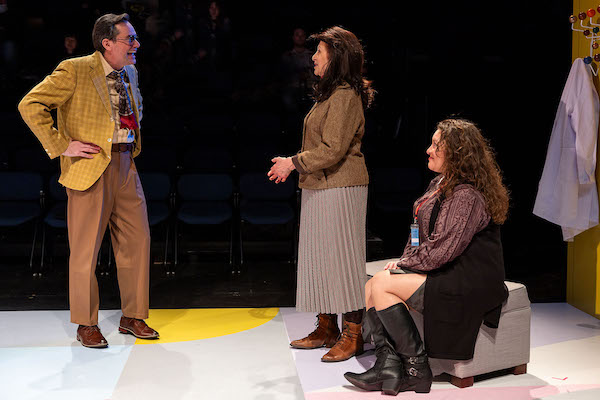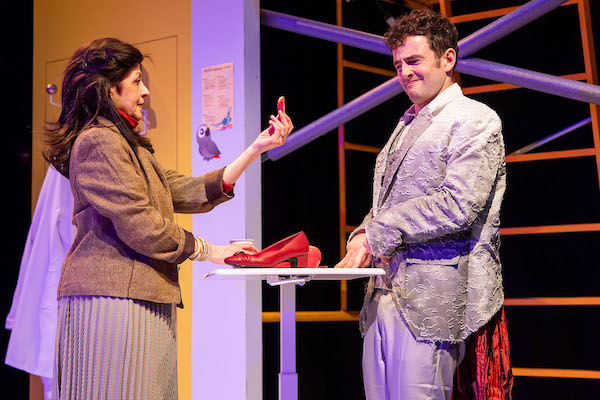Theater Review: “Beyond Words” — Homage to a Brainy Bird
By David Greenham
Beyond Words tells an important story in an entertaining as well as a delightfully educational way.
Beyond Words by Laura Maria Censabella (Inspired by the life of Irene Pepperberg and Alex). Directed by Cassie Chapados. Scenic design by Qingan Zhang. Costume design by Sandra Zhihan Jia. Lighting design by Amanda Fallon. Sound design by Anna Drummond. Props design by Julia Wonkka. A Catalyst Collaborative@MIT production at the Central Square Theater, Cambridge, through April 14.

Bill Mootos, Stephanie Clayman, and Karina Beleno Carney in the Catalyst Collaborative@MIT production of Beyond Words. Photo: Maggie Hall
The relationship between Alex (Jon Vellante), an African grey parrot, and Dr. Irene Pepperberg (Stephanie Clayman), who worked meticulously with him for 30 years, received an enormous amount of press in the first decade of the 21st century. Pepperberg’s first book, The Alex Studies: Cognitive and Communicative Abilities of Grey Parrots, laid out her discovery: the mind of a bird could rival the often-studied consciousness of primates, offering more proof that humans aren’t the only beings with complex cognitive abilities. Her 2008 New York Times bestseller, Alex & Me: How a Scientist and a Parrot Discovered a Hidden World of Animal Intelligence — and Formed a Deep Bond in the Process, chronicled their journey, a reflection that helped her and others mourn Alex’s death by natural causes in 2007.
Beyond Words begins in 1976 in a Harvard Study Center with chemistry doctoral student Irene Pepperberg admitting “I hate what I’m doing now.” Her passion is biology and birds. Encouraged by Rick (Bill Mootos), her then boyfriend, and later her husband, Irene goes to a local pet store to buy a parrot. She is so determined to launch an unbiased study of birds that she has the pet shop attendant randomly select one. She names it Alex, an acronym for her Avian Language Experiment.
Irene devotedly pursues establishing communication with the bird through a series of repetitive actions. Alex shows promising signs of understanding, especially of paper — among keys, balls of wool, and colorful blocks of wood – though it is the most difficult word for Alex to pronounce. But, with practice, ‘a-er’ is eventually supplied its first letter to become “pay-per.”
As the breakthroughs grow, so does Irene’s dedicated devotion to her research. Soon she’s got several volunteer lab assistants who help her develop a new model/rival technique, where Alex’s jealousy at someone else succeeding with cognitive functions inspires him to work harder and learn faster. Within a couple of years, she receives her first funding.
But the world of research and academic competition is very frustrating. The constant search for funding, along with rampant sexism and the self-importance of colleagues, forces her to jump from lab to lab. Astoundingly, no one seems to care all that much about the need for us to try to understand the animals we coexist with. “The earth is screaming. It’s dying and no one is listening,” she shouts at one point.

Stephanie Clayman and Jon Vellante in the Catalyst Collaborative@MIT production of Beyond Words. Photo: Maggie Hall
Not surprisingly, Irene’s single-minded determination affects her marriage. Rick searches for a tenured position in his chosen field, but he can’t seem to land in the right spot. Irene fits in paid chemistry teaching jobs around her mostly unpaid hours of research. Eventually, they divorce. Then Irene finds a colleague who will support her work, Dr. Lourdes Acevedo (Karina Beleno Carney), who is researching the cognitive functions of dolphins. They commiserate about their uphill battle through frequent phone calls. Irene also meets a pompous and sexist rival, Dr. Howard “Howie” Towers (also Mootos) who, in his work with primates, has found success via narrow-minded conclusions. He eventually becomes her boss — and would like to become something more.
Time passes and highlights are benchmarked: a move to a new lab or job, a successful grant, an important conference, and a heartbreaking confrontation. These are date stamped, so the audience can mark time as it passes. Finally, Irene landed her dream job at the University of Arizona, where labs are designed just the way she wants, she has a staff of TAs, and more birds to study. But then the terror of 9/11 happens and all of her funding is pulled. Irene moves back to Boston, gets a gig at Brandeis and then a fellowship at Radcliffe before Alex’s death crushes her world. That is where the play — but not her story — ends.
Beyond Words is a love letter, of sorts. As Irene, Clayman shifts from narrator to character, which is an efficient way to keep the events moving along. As in real-life, Alex steals the show. Jon Vellante is mesmerizing playing the brainy bird: his intense focus, enhanced by subtle physical ticks, transforms him into the seminal African grey parrot. He gives us a fowl who is always listening to what is going on around him. Even when Alex is not in the scene, he’s present, and eavesdropping.
Mootos and Beleno Carney, move in and out of the drama, providing much-needed grounding given the roller coaster ups and downs of Irene’s career. A nimble ‘Chorus,’ made up of Kandyce Whittington, Ken Yotsukura, and Matthew Zahnzinger, provide the narrative with momentary glimpses of students, colleagues, and pompous professors. Their cameos are effective, but all too often the script calls on the performers to play caricatures whose sole purpose is to elicit laughs.
Qingan Zhang’s bright and colorful set, Sandra Zhihan Jia’s quick-change costumes, Amanda Fallon’s sculpted lights, Anna Drummond’s bouncy soundscape, and Julia Wonkka’s handy props keep the staging moving along in an orderly fashion. Under the guidance of Cassie Chapados’s crisp, rapid-fire direction, the two-hour show — with an intermission — zips by.
But that speediness also presents a challenge. In a program note, Dr. Pepperberg provides an illuminating perception. Alex’s death was devastating to her. Pepperberg writes, “I coped by entering interview mode where, scientist that I am, I completely ignored my emotions and just focused on the facts.” Censabella’s script does the same, taking a doc-u-drama route.
This is not to say there aren’t some emotional payoffs here. A wonderful second act scene between Irene and her best friend Lourdes digs into the frustration that women all too often feel in the male dominated field of science. But dramatic encounters that could go deeper are cut short abruptly — either with a comic bit or Irene stepping out to add some explanatory narration. Beyond Words would benefit from taking a cue from its title: slow down and let us admire, be amazed, at Alex’s learning. There’s theatrical power in an appreciation of discovery.
Still, thanks once again to Central Square Theater and MIT’s Catalyst Collaborative for the fabulous Brit d’Arbeloff Women in Science program. Beyond Words tells an important story in an entertaining as well as a delightfully educational way.
David Greenham is an adjunct lecturer on Drama at the University of Maine at Augusta, and is the former executive director of the Maine Arts Commission. He has been a theater artist and arts administrator in Maine for more than 30 years.
